
Our November issue ventures into the haunted netherworld of gothic cinema as we speak to Guillermo del Toro about his magnificently spooky new film Crimson Peak – which stars Mia Wasikowska as a young American woman who in the early 20th century travels to a grand, ornate mansion in the Lake District, home of the mysterious baronet Sir Thomas Sharpe (played by Tom Hiddleston) and his icy sister Lady Lucille (Jessica Chastain).
Posted to subscribers and available digitally 2 October
→ Buy now
→ Access the digital edition
→
On UK newsstands 6 October
Del Toro has long drawn inspiration from the deep well of the gothic, not least in his earlier masterful ghost and fantasy tales The Devil’s Backbone and Pan’s Labyrinth, but Crimson Peak is the Mexican director’s most richly gothic movie yet – and a creative triumph that may be his best film so far. He talks to Mar Diestro-Dópido about how he wanted to capture the same atmosphere as the big Hollywood gothic fantasies of the 1940s – films such as Hitchcock’s Rebecca and Lean’s Great Expectations – and about his own encounters with ghosts.
Andrei Tarkovsky may never have explored the Gothic tradition, but in his seven films he helped to create a new space in cinema that reached beyond realism and the everyday and into a more poetic realm. As the BFI Southbank holds a full Tarkovsky retrospective and an accompanying Sight & Sound Deep Focus season that explores the Russian director’s legacy, Nick James considers how Tarkovsky helped to redefine the possibilities of arthouse cinema, and traces the threads of his influence through 12 films by different filmmakers who, in varying ways, owe him a debt – from Lars von Trier and Terrence Malick to Claire Denis and Béla Tarr.
The Greek director Yorgos Lanthimos’s latest film The Lobster takes a rather different approach to exploring a cinematic terrain beyond straight realism. It’s a wry, satirical fantasy about a world in which singletons are forced to pair up or face being turned into animals. Lanthimos talks to Trevor Johnston about making his first film outside his native Greece, and about working with stars like Rachel Weisz and Colin Farrell.
Our other features this month concern films or subjects more rooted in the tough realities of real life. Michael Atkinson considers how Denis Villeneuve’s new drug cartel drama Sicario sits in a growing line of films set amid the violent and unstable US-Mexico borderlands. Isabel Stevens talks to Carey Mulligan about her role as a radical advocate of women’s rights in Sarah Gavron’s new film Suffragette; and John Wyver explores a new BFI-curated programme of little-seen television documentaries from the 1950s and 60s, and finds them fascinating not only for the window they give onto a vanished past, but also how personal and experimental such nonfiction television work could be in those years. Many of such TV films were directed by figures who went on to work in cinema – men such as Ken Russell, John Schlesinger and Peter Watkins; but there were also others who are yet to receive their due – something the forthcoming BFI Southbank season and two DVD boxsets will go some way to putting right.
Elsewhere in the issue, we report on the big titles that premiered at the Venice and Toronto film festivals in September – from Ben Wheatley’s J.G. Ballard adaptation High-Rise and Terence Davies’s Sunset Song to Charlie Kaufman’s Anomalisa and Luca Guadagnino’s A Bigger Splash.
Our Wide Angle section features a profile of Valeria Sarmiento, whose own work has often been overshadowed by her collaborations with her late husband, Raúl Ruiz. And Stewart Lee takes time out from his current stand up tour to pen a tribute to his “favourite British filmmaker”, Andrew Kötting.
Our Reviews section features in-depth reviews of every new theatrical release, while our Home Cinema section celebrates a magnificent new Blu-ray edition of John Ford’s magisterial western My Darling Clementine. Our Books pages consider a new study of David Lynch’s work, an exploration of American neo-noir films and early cinema studios.
Finally, David Thomson rounds out the issue with a consideration of the memorable final scene of Terrence Malick’s The Thin Red Line. All this and more…
Features
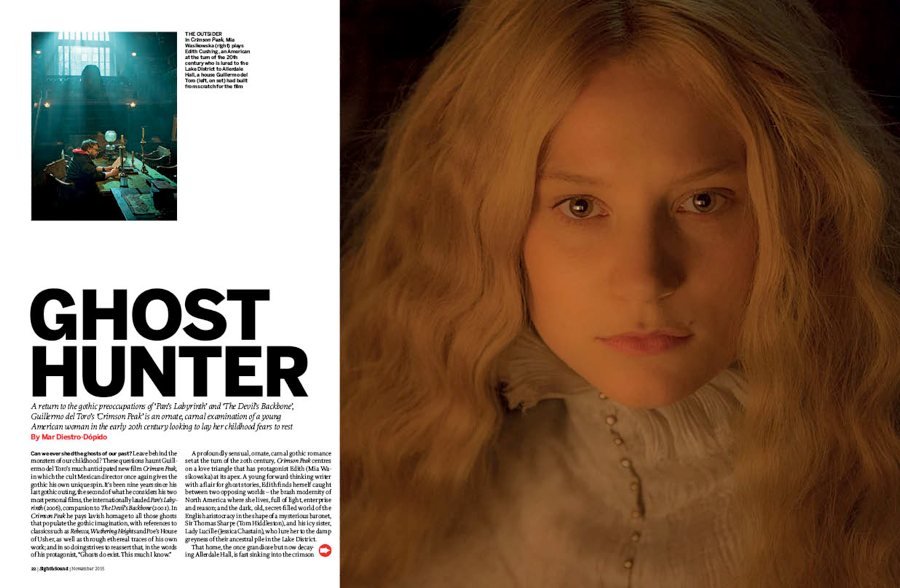
Ghost Hunter
A return to the gothic preoccupations of Pan’s Labyrinth and The Devil’s Backbone, Guillermo del Toro’s Crimson Peak is an ornate, carnal examination of a young American woman in the early 20th century looking to lay her childhood fears to rest. By Mar Diestro-Dópido.
☞ See Guillermo del Toro’s top ten films in our 2012 Greatest Films of All Time poll
☞ Read Guillermo del Toro’s essay Lessons in Darkness in our August 2012 issue or in the BFI compendium 39 Steps to the Genius of Hitchcock.
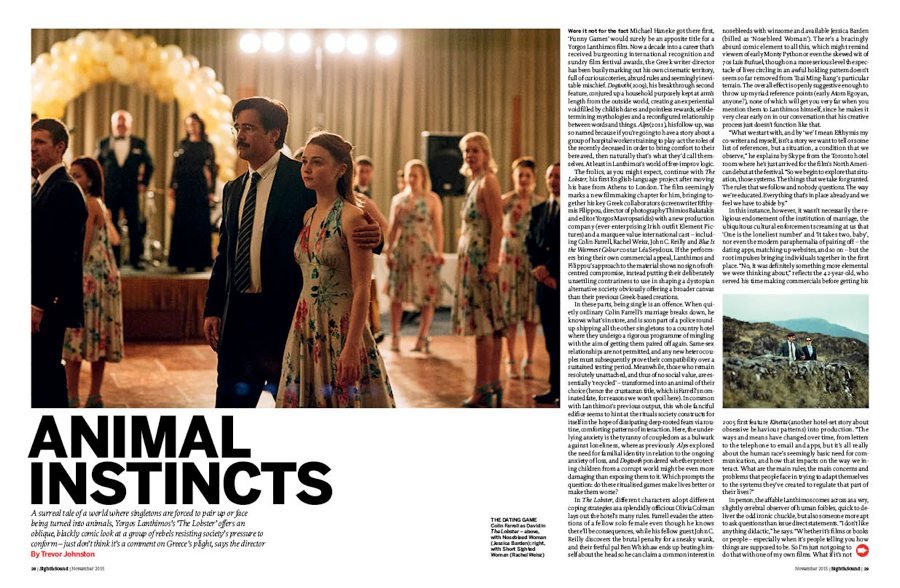
Animal Instincts
A surreal tale of a world where singletons are forced to pair up or face being turned into animals, Yorgos Lanthimos’s The Lobster offers an oblique, blackly comic look at a group of rebels resisting society’s pressure to conform – just don’t think it’s a comment on Greece’s plight, says the director. By Trevor Johnston.
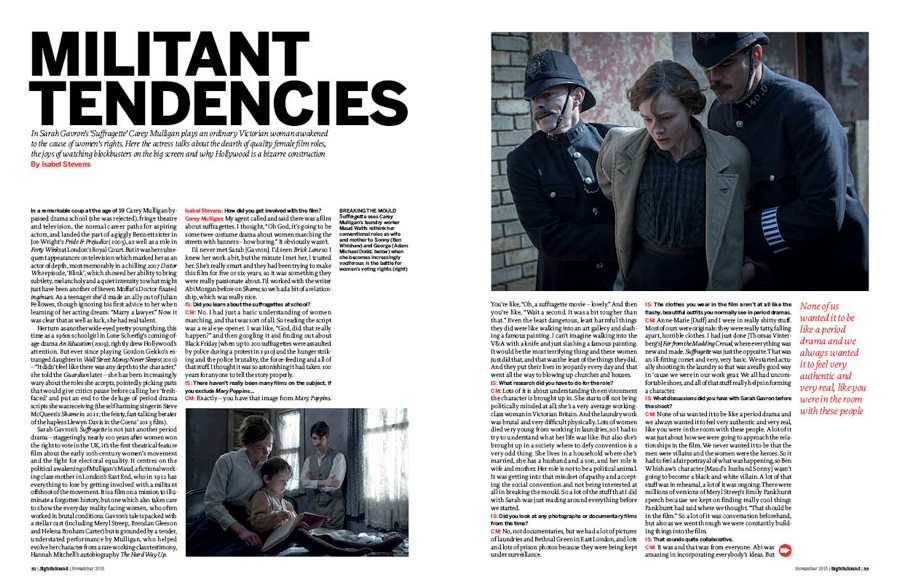
Militant Tendencies
In Sarah Gavron’s Suffragette Carey Mulligan plays an ordinary Victorian woman awakened to the cause of women’s rights. Here the actress talks about the dearth of quality female film roles, the joys of watching blockbusters on the big screen and why Hollywood is a bizarre construction. By Isabel Stevens.
+ First among equals
An anthology of films documenting the rise of the women’s suffrage movement in the UK offers a fascinating portrait of shifting gender roles in the early years of the 20th century. By Pamela Hutchinson.
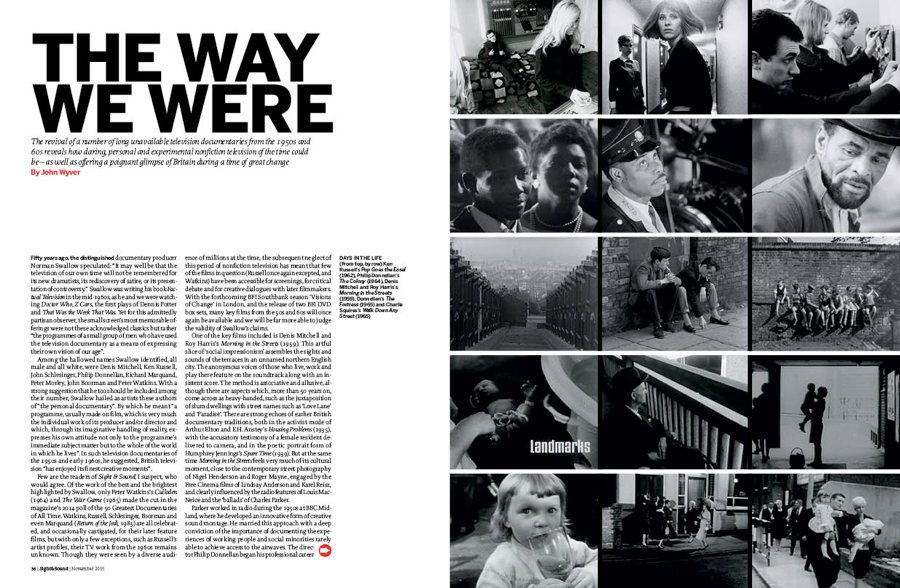
The Way We Were
The revival of a number of long unavailable television documentaries from the 1950s and 60s reveals how daring, personal and experimental nonfiction television of the time could be – as well as offering a poignant glimpse of Britain during a time of great change. By John Wyver.
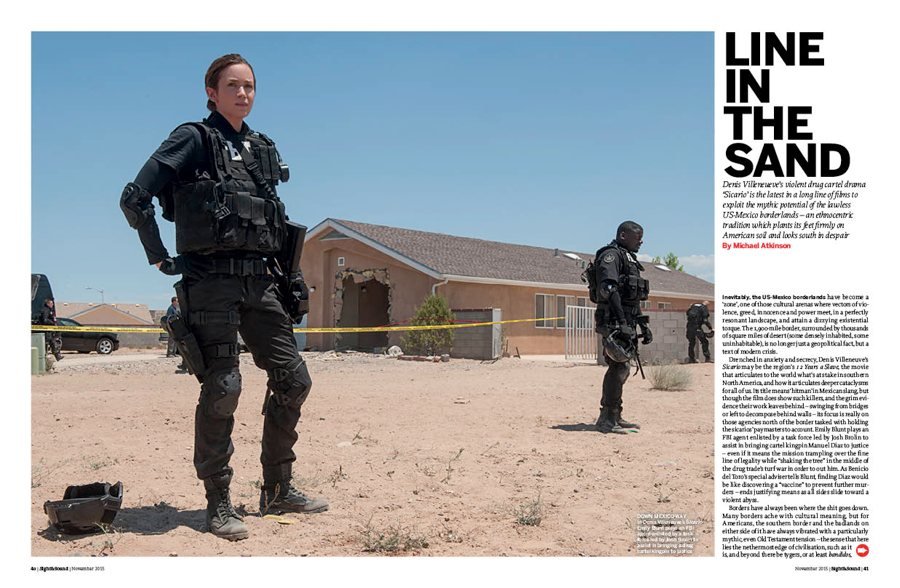
Line in the Sand
Denis Villeneueve’s violent drug cartel drama Sicario is the latest in a long line of films to exploit the mythic potential of the lawless US-Mexico borderlands – an ethnocentric tradition which plants its feet firmly on American soil and looks south in despair. By Michael Atkinson.
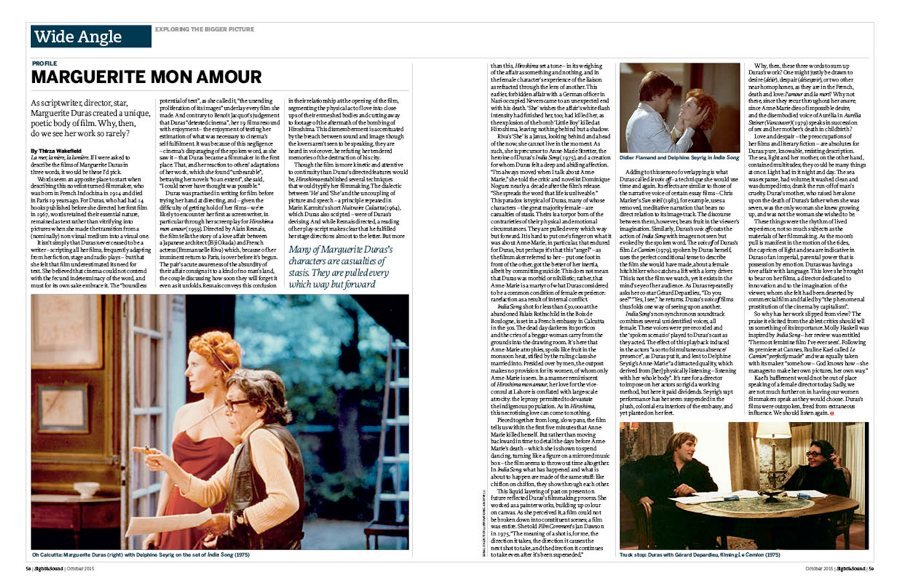
Deep focus: The Tarkovsky Legacy
The slim body of work produced by the great Russian director Andrei Tarkovsky (1932-86) – seven transcendent, spiritual films marked by exquisite visual imagery, mesmerising long takes, a near-pantheistic reverence for landscape and nature, and a seamless blending of real time, dream and memory – helped redefine the possibilities of arthouse cinema. His enduring influence can be seen in the eclectic array of filmmakers of the past 30 years whose work, in different ways, owes him a debt, from Lars von Trier and Terrence Malick to Béla Tarr and Claire Denis. By Nick James.
☞ Read Stalking the Stalker: Geoff Dyer on Tarkovsky
Regulars
Editorial
Precious cargo: art and refugees
Rushes
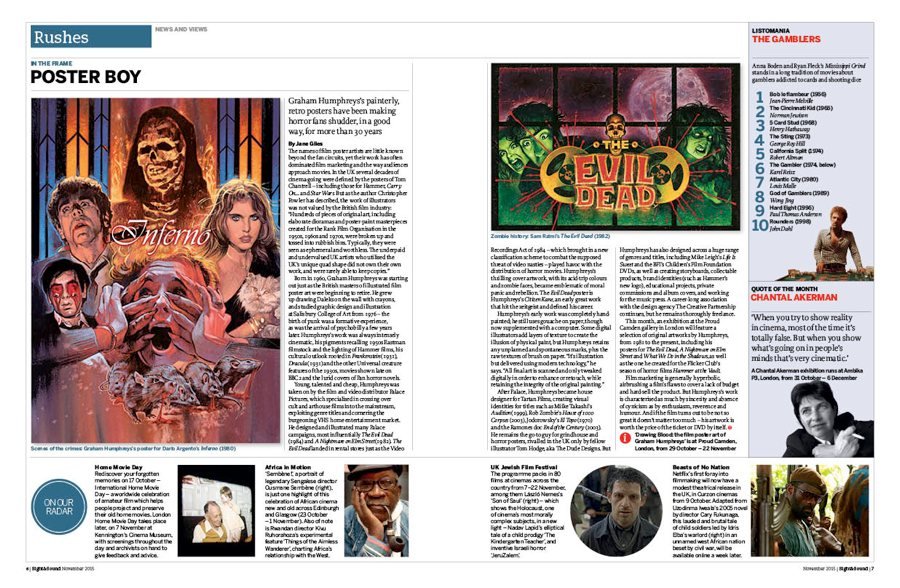
Our Rushes section
In the frame: Poster boy
Graham Humphreys’s painterly, retro posters have been making horror fans shudder, in a good way, for more than 30 years. By Jane Giles.
Listomania: Hip-hop films
Object lesson: Where’s the beef?
The hamburger phone in Juno follows a tradition of ironic teen accoutrements in US indie comedy – but what’s all that irony hiding? By Hannah McGill.
The five key…: Solo survival dramas
On an island, in the desert, at sea or in space – the lone individual struggling to stay alive can make for gripping drama. By Nick Pinkerton.
Dispatches: Time for a change
Transgender is suddenly a popular subject – but transitions of all sorts, crossing boundaries, are at the heart of film. By Mark Cousins.
The industry
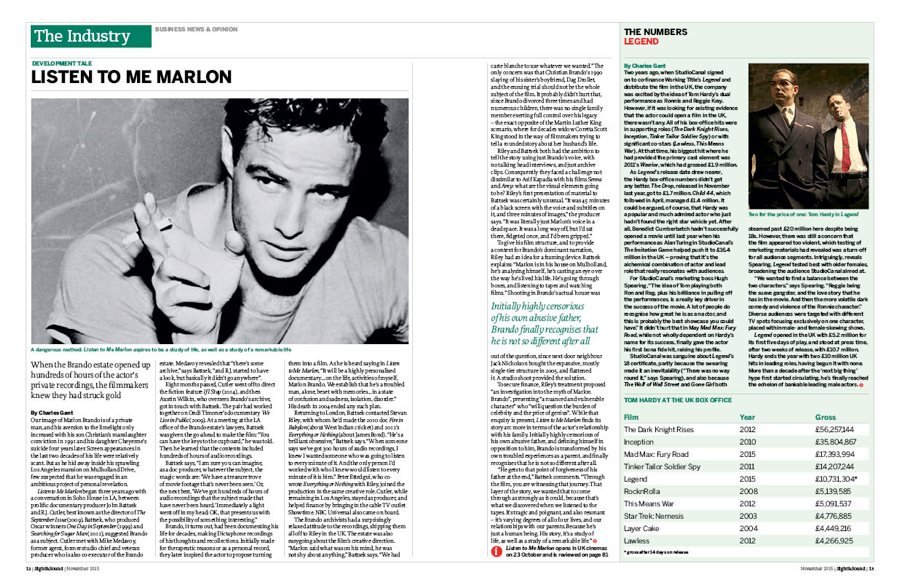
Our Industry section
Development tale: Listen to Me Marlon
When the Brando estate opened up hundreds of hours of the actor’s private recordings, the filmmakers knew they had struck gold. By Charles Gant.
The numbers: Legend
Tom Hardy at the UK box office, by Charles Gant.
Brewster: Deep waters
John Waters’s spectacularly unorthodox career offers a host of invaluable lessons for aspiring, struggling filmmakers. By Ben Roberts.
☞ See our September 2015 issue, John Waters Talks Trash
Festivals
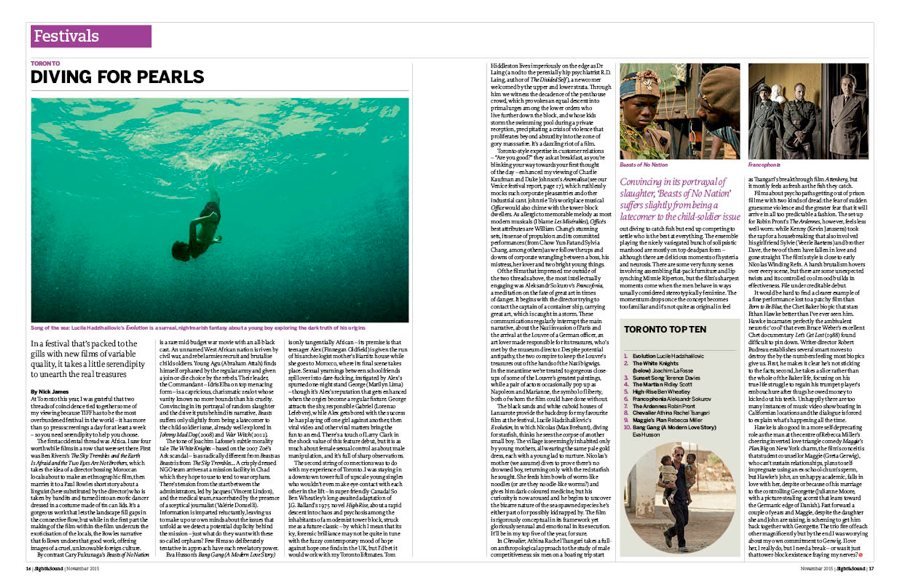
Our Festivals section
Toronto: diving for pearls
In a festival that’s packed to the gills with new films of variable quality, it takes a little serendipity to unearth the real treasures. By Nick James.
☞ See our online first-look reviews from Toronto 2015
Venice: lions for lambs
This year’s Venice Film Festival had its bland moments – but it was certainly better than the one the Competition jury went to. By Jonathan Romney.
FrightFest: blood sport
The dominant theme at this year’s festival seemed to be the sense of being trapped, mentally, physically or, most often, both. By Kim Newman.
Wide angle
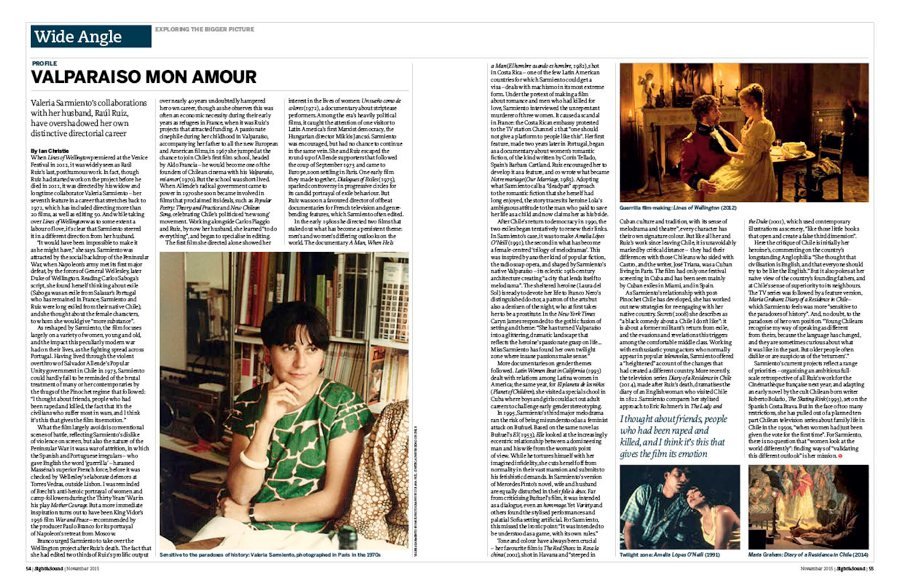
Our Wide Angle section
Profile: Valparaiso mon amour
Valeria Sarmiento’s collaborations with her husband, Raúl Ruiz, have overshadowed her own distinctive directorial career. By Iain Christie.
Soundings: Industrial revolutionaries
Two new documentaries tracing the origins of the industrial music scene suggests that it wasn’t all nihilistic destruction. By Colm McAuliffe.
Primal screen: The world of silent cinema
In his first film, Anthony Asquith lampooned the excesses of the film industry – and declared how much he adored it. By Bryony Dixon.
Tribute: Man on fire
The banal-sounding premises and mysterious motivations of Andrew Kötting’s films contain a world of beauty and genius. By Stewart Lee.
Festival: Eastern approaches
Facing official disapproval at home, the Beijing Independent Film Festival is flourishing in a new guise in New York. By Sukhdev Sandhu.
► Watch Kevin B. Lee’s video report from the 2012 Beijing Independent Film Festival
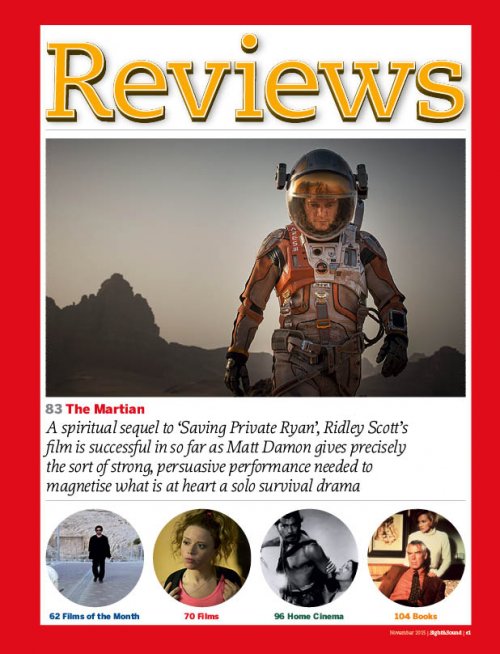
Our Reviews section
Reviews
Films of the month
By Our Selves
Fidelio: Alice’s Journey
Letters to Max
Taxi Tehran
plus reviews of
Addicted to Fresno
The Black Panthers: Vanguard of the Revolution
Captive
Censored Voices
Convenience
The Death and Resurrection Show
A Dozen Summers
The D Train
Everest
Fresh Dressed
A Haunting in Cawdor
Hellions
Hitman: Agent 47
The Intern
Lessons in Love
Life
Listen to Me Marlon
The Lobster
Made You Look
Make More Noise! Suffragettes in Silent Film
The Martian
Maze Runner: The Scorch Trials
McFarland, USA
Miss You Already
Mississippi Grind
The Nightmare
The Program
Red Army
Sicario
Sinister 2
The Sound of Fury
Suffragette
SuperBob
They Will Have to Kill Us First
The Transporter Refuelled
The Visit
We Are Your Friends
Home Cinema features
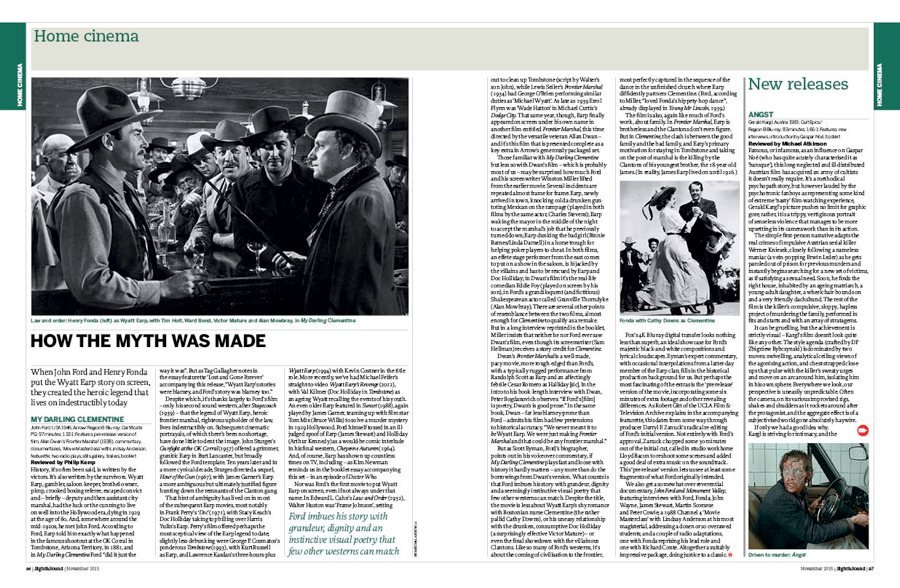
Our Home Cinema section
How the myth was made: My Darling Clementine
When John Ford and Henry Fonda put the Wyatt Earp story on screen, they created the heroic legend that lives on indestructibly today. By Philip Kemp.
Revival: Night and the City
Jules Dassin was himself fleeing the anti-communist blacklist when he made this on-the-run movie in a seedy post-war London. By Kim Newman.
Lost and found: Enamorada
A uniquely Mexican take on The Taming of the Shrew mixes macho action, screwball comedy and rapturous romance. By Philip Concannon.
plus reviews of
Angst
Dragon’s Return
L’eclisse
Emperor of the North
Fat City
The French Lieutenant’s Woman
Films by Wojciech Has
The Man Who Could Cheat Death
Rashomon
Robbery
3 Women
Television
The Green Man
The Knick
Microbes and Men
Books
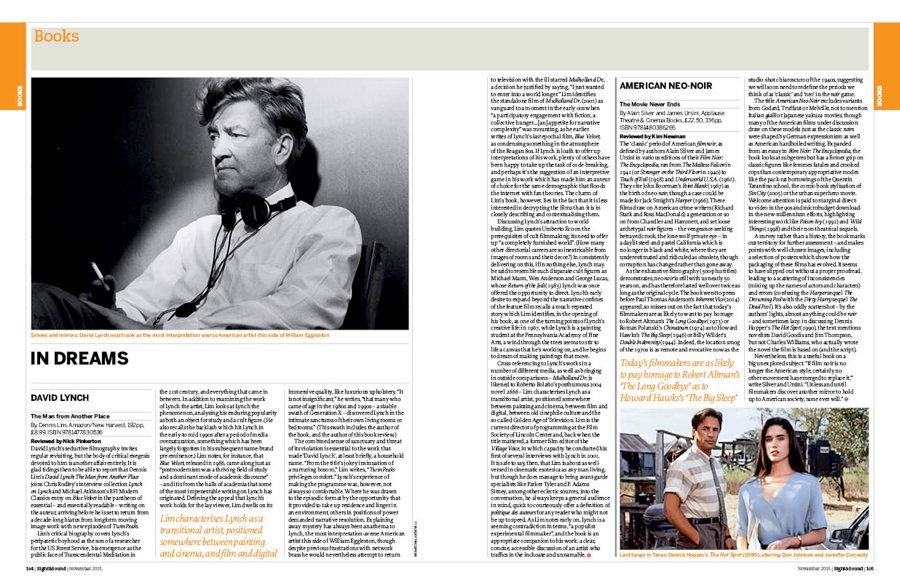
Our Books section
David Lynch: The Man from Another Place by Dennis Lim (Amazon/New Harvest) reviewed by Nick Pinkerton.
American Neo-Noir: The Movie Never Ends by Alain Silver and James Ursini (Applause Theatre & Cinema Books) reviewed by Kim Newman.
Studios Before the System: Architecture, Technology, and the Emergence of Cinematic Space by Brian R. Jacobson (Columbia University Press) by Ian Christie.
Letters
More top girls
A history of female film editors (and an addendum)
Scala memories
Tim Lucas contra Tony Rayns
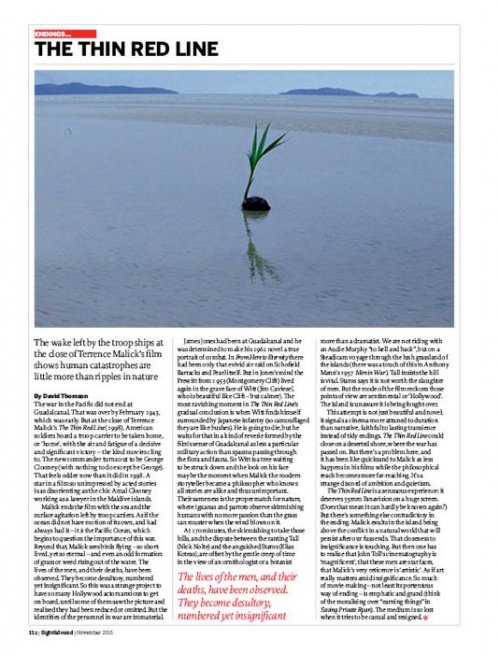
Our Endings section
Endings
The Thin Red Line
The wake left by the troop ships at the close of Terrence Malick’s film shows human catastrophes are little more than ripples in nature. By David Thomson.
Further reading
-
The Digital Edition and Archive quick link
Log in here to your digital edition and archive subscription, take a look at the packages on offer and buy a subscription.














